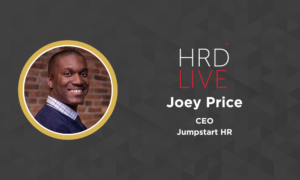HRD Thought Leaders on leadership in 2020
- 7 Min Read
Gathering perspectives on one of the most pressing issues faced by leaders this year.
- Author: HRD Connect
- Date published: Dec 28, 2020
- Categories

In this special end-of-year series, our panel of renowned HR experts and influencers dissect some of the most pressing issues brought to light by recent events. In this edition, leadership in 2020 goes under the microscope.
2020 has been a revolutionary year for HR. From strategic overhauls to technological transformation, additional visibility plus new demands for support, leaders in every sector have experienced significant change, with progress only set to continue in the time ahead.
That said, not every leader has had an identical experience; regional differences, organizational culture and employee needs are all variable factors, meaning that each leader essentially has a tailored set of challenges and opportunities to respond to.
To that end, learning from peers, picking up actionable tips and discovering first-hand experiences are vital to refining strategies for 2021.
Jill Christensen
Employee engagement expert and best-selling author – @JillSpeaker
There is a major lack of leadership in our world today. Not only in business, but in every sector, including government, education, and beyond. A great place to start?
It’s everyone’s responsibility to know their strengths and development areas, and commit to being a better leader tomorrow than you were today. If you don’t lead people at work, your newfound skills will still make a difference, be it in your neighbourhood, family, church, community or the world.
Debra Corey
Author, speaker and employee engagement expert – @DebraCoreyRebel
Another area of focus throughout the year has been our leaders, with organizations recognizing that their role has become even more critical than in the past. They have truly become a lifeline to their employees, with organizations focussing on upskilling them in order to better understand and support a more remote workforce with a wider range of needs and challenges.
Whether it’s leading with more empathy and compassion, communicating in a more meaningful and effective way, listening and recognizing more, leaders have stepped up to take on this important challenge. Going forward, I believe that companies will continue to evolve the role of leaders to meet these changing needs, which will ultimately translate into how we hire, promote, train and reward leaders in the future.
Janine Dennis
Chief Innovation Officer, Talent Think Innovations – @MzJanineNicole
Leaders are typically in the hot seat, but it is my belief that 2020 exacerbated that fact. The true test of a leader is hardly anything we have spent a lot of time speaking about in the last decade as it pertains to leadership. It turns out a successful leader in the 20’s has to be someone who is dedicated to being of service to their employees.
They have to be able to handle crisis with grace, while extending grace when their people may not feel or be at their best. Measuring the efficiency and overall performance of leadership during times of relative ease doesn’t illuminate a person’s resilience to weather more difficult times. It would seem we are in for some turbulent times during this decade.
Organizations will have to evaluate their current leadership to decide whether the skillsets they currently have at the leadership level have the ability to sustain them and their employees over the next 9 years. It will be important to reevaluate what makes for a good leader and ensure that those values are front and center from recruitment through any training and development you deploy. Developing soft skills within your leaders could be a game-changer in improving and sustaining harmonious employee-employer dynamics.
Chuck Heaton
People & culture expert and senior HR consultant
2020 has been one of the greatest global leadership tests for business since the 2008 financial crisis. For the first time since World War II, the globe has been consumed by a crisis that has impacted every corner of the earth, disrupted global commerce, and had a huge impact on personal health. My mantra for 2020 was “be prepared to be unprepared.”
Companies with strong leaders who are adaptive and innovative have found a path to survive and even thrive in this environment. Companies with poor leadership have struggled, declined and in some cases ceased to exist. 2021 will continue to require strong leadership to navigate the continued uncertainty driven by the course of the pandemic.
Another take on leadership is that 2020 has thrust HR leadership to the forefront unlike ever before in business. Executive leadership has looked to HR for a wide range of guidance regarding pandemic issues, such as remote working policies, COVID exposure and return to work, communications, organizational structure, technology upskilling, culture and employee engagement. I believe 2021 will see a transition in HR leadership in companies where that leadership was not up to the level needed in the pandemic.
Jon Ingham
Author and consultant – @JonIngham
In my HRD Summit Co:lab in February 2020, I suggested that organizations need to build on existing functional leadership approaches with more focus on leading teams, communities and networks. In 2021, it will leading distributed networks which will be most important. Building business and organization strategies that will take us out of and beyond the pandemic will require different approaches from the ones we’re used before.
And this innovation will depend on connecting people from all over our organizations to share insights, perspectives and ideas for the future. Unfortunately, it is these more discretionary, distributed, weak tie connections that have suffered most during 2020. HR and other business leaders urgently need to put in place new mechanisms and switch to new behaviors which will make up for the fact that people have not been bumping into each other in the corridors, hanging out at the water cooler, or gossiping over lunch.
Leaders now need to focus on brokering these connections, developing new relationships and facilitating the meaningful conversations that will drive the required transformations in our businesses.
Terence Mauri
Global disruption thinker, author and speaker – @TerenceMauri
The pandemic turned our leadership models upside down. It forced HR and business leaders to rethink the nature of work, the workplace and the workforce. In many ways the pandemic was an accelerant for change for trust, ethics and transparency and has given leaders a unique opportunity to not just return to normal, but reimagine relevancy.
Stuart Crainer, co-founder at Thinkers50, the global ranking authority of top management thinkers in the world says: “The focus of leadership over recent years has been on the impact of AI, Big Data and other technologies on the practice of leadership. How can and should leaders utilize technology? Where does technology leave traditional core leadership skills such as judgement?
The pandemic has changed the emphasis. The leadership agenda over 2021 and beyond will focus on people as never before. Leaders will have to figure their way through a complex array of issues — more people working remotely, fast changing and often declining markets, uncertainties piled on uncertainties. Listening, empathy and emotional intelligence will need to be to the fore for leaders in the post-Covid era. For many these will be new and sometimes impossible skills, but they are and will remain critical.”
The key takeaway: To win next year and beyond, leaders must always be in a perpetual state of beta learning, unlearning and re-learning. Now is not the time to adopt a ‘wait and see’ strategy. As agents of change, it’s time for leaders to rip up the rulebook on ‘leadership as usual’ and move beyond disruption: human-led, tech-enabled; intentionally diverse; purpose-driven (not purpose ‘washing’); operationally nimble and built for speed.









